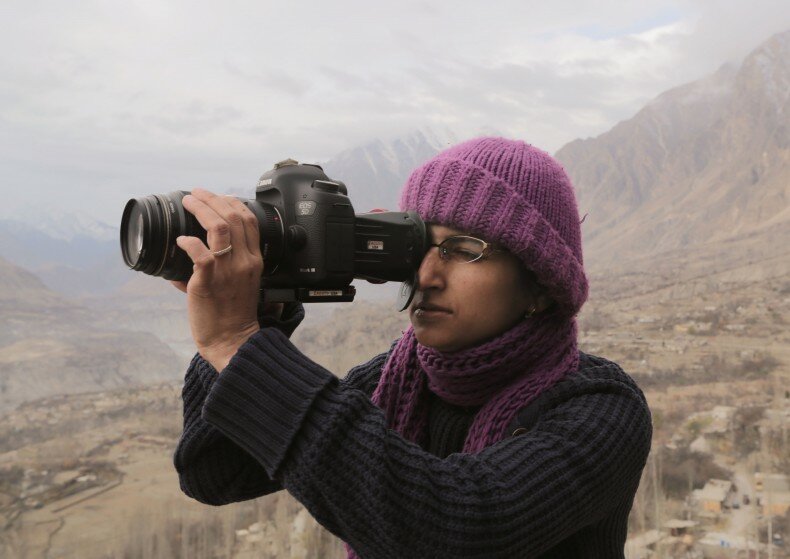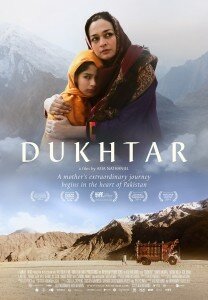By A Rahim Khan –
Pique’s exclusive interview with Afia Nathaniel – Director of Dukhtar
The fall season has brought with it an uncharacteristic spate of Pakistani film releases, and while still shy of the usual glut of either Bollywood or Hollywood, the quantity and indeed the quality are most encouraging.
From spy thriller Operation 021 to comedy romp Na Maloom Afraad to drama Dukhtar, Pakistani cinema has finally given a good account of itself, offering films that may not necessarily be award worthy but certainly worth watching. All three films have generated good buzz and at least for this critic, they have begun to resemble to kind of film that one could get behind.
Dukhtar, a drama about a mother trying to save her daughter from a child marriage, is filmmaker Afia Nathaniel’s feature film debut. Set against the barren north, the film is based in part on a true story that Nathaniel heard and while being an intimate portrayal of filial relationships, it also highlights the rampant practice of child marriages, one that is generational in the film.
As for the filmmaker, she brings quite a varied career to the table having studied computer sciences in college, working in advertising as well as in the non-profit sector later shifting over to film and doing what she loves most – telling stories. Joining the ranks of Pakistani indie filmmakers who are slowly carving a niche for themselves, Nathaniel also joins the distinct company of female filmmakers such as Sharmeen Obaid Chinoy and Iram Parveen Bilal who are outdoing their male counterparts.
Premiering the film at the Toronto Film Festival Nathaniel has since taken it to the London Film Festival and then onwards to Norway and in between her jet-set schedule, she spoke to Pique about the film, the film industry and her next project.
From a science major and a career in advertising to now writing and directing films, you’ve made quite the career change, what drew you to filmmaking? How did this change come about?
The reason why I went into computer science was because I loved sci-fi. At one point, I thought I was going to specialize in Artificial Intelligence. However, I was always a storyteller. I loved exploring characters and different worlds in my writings. After graduating from LUMS as a computer scientist, I knew it was time to shift gears and do what I loved most – tell stories.
But there just weren’t any film schools in Pakistan then to train myself. So I went into advertising and learnt the craft of telling stories in 30 seconds. It was an invaluable experience. Meanwhile, I took up photography and became a student of light and taught myself screenwriting for fiction films. I applied for graduate studies in filmmaking to a few universities and got a phone call which changed my life. It was the Chair of the Film Division at Columbia University. They loved my screenplays and photography work and so he offered me a Dean’s Fellowship of two years to come to New York and do my MFA in Film Directing. I packed my bags and left for New York. Studying and working in New York was an incredible experience and I have truly found my love in life with film.
Despite having a cinematic tradition, film in Pakistan reached its nadir in the past couple of decades. Now we see a resurgence both in infrastructure (cinemas, schools etc) and filmmakers. What would you attribute the lull in between to?
Empires rise and fall. Same with the film industry. It is a natural part of the evolving nature of any industry. Pakistan carried on with its Bollywood sensibility in its heyday and then there was a slump. The rest of the world, cinemas of countries went through various phases, movements and transformations but Pakistan remained stuck in time. You can attribute it to various factors especially the socio-political hardships but mainly it was being stuck in a rut – creatively speaking.
But now there are stirrings of new possibilities. It’s an interesting moment in our cinema industry’s history that we are poised at the brink of several possibilities which can propel us into new interesting directions. There is reason to believe that there is a resurgence with a few of us doing something different – telling different kinds of stories and experimenting with different structures and styles. I am not so sure about what is it that our film schools are doing though. I have looked at what it being taught is some of the schools and there seems to be no real understanding of the feature film industry creatively as well its business side even now. Just recently, a screenwriting initiative called Qalambaaz has been started by Iram P Bilal. I believe it is a great step in the right direction because we need an alternative way to train emerging feature film screenwriters in Pakistan by established screenwriters who work in the global marketplace. It’s very important for emerging filmmakers to connect with what is happening in the rest of the world so that they can find their own place.
It is often cited that societal and religious pressures have often stymied Pakistan’s film industry, yet in neighboring Iran, where religious censure is even greater, they have a thriving industry, what are your thoughts on this?
Pakistan is a very different country from Iran and we should aspire to make films of any kind and not just look to Iran as an example. Some of these Iranian films have a great life in the festivals and with film critics but not so much in their own country. At least, in Pakistan, you have the liberty of releasing arthouse films and DUKHTAR is a great example. Not only is the film getting rave reviews from international film critics but it has done well for a local arthouse film within its own country. So I am very hopeful for the Pakistani industry to survive the many challenges it already faces.
While there have been big budget movies making a splash, it seems that Indian cinema is spearheading the revival of Pakistani cinema, would you agree?
I don’t think we have a revival in the true sense of the word. I call it “survival”. As independent artists we are doing what we do best – we are creating. But you need a critical mass of content which can play for global audiences and not just local audiences before true revival happens in any industry. You also need a really diverse kind of cinema to exist for that revival to take root. Right now, we’re only churning out one indie feature film per year (on average) and that’s not really a critical mass of content. In another five years, this should change for the better.
Most recent films coming out from Pakistan have focused either on social issues (Bol, Josh) or then terrorism (Khuda Kay Liye, Waar). Why is that local filmmakers are sticking to these genres? Do you think they’ve fallen into a rut? Why aren’t we seeing anything different?
Fallen into a rut? You’re naming only four films out of ten films made in the past few years. The reason why you think they are in a “rut” is because we lack a healthy number of films coming out every year. This is an industry trying to jumpstart so give it a chance. Unless you have Pakistani financiers willing to take a risk with new kinds of stories and storytellers we will remain in the “rut”. It’s all about the money. Today, Indian content flourishes because their own people, their own industry invests in its own films. If Hollywood were to suddenly evaporate overnight, Bollywood would still thrive because it has a healthy financing base along with the creative base. That’s not the case in Pakistan. I for instance, want to make a sci-fiction film as my next film. The question is which Pakistani investor(s) will believe in it.
And as an extension of this question, you mentioned in a recent interview that you’re next possible project will be a sci-fi. Keeping the above in mind, why did you not go with that as your first film? (Of course assuming that the idea/script were ready) Do you think the genre would not have appealed to local audiences or possibly not have found funding?
The sci-fi film is a much bigger film than my first project. I am writing the screenplay and would love to shoot it in the next two years.
How did Dukhtar come about? Why particularly this story?
In 1999, I heard a story which refused to let go of me. It was the courageous story of a mother from the tribal areas who runs away with her two young daughters. That became the seed for a fictional feature film DUKHTAR.
In the film, the mother and daughter meet this third main character, a cynical ex-mujahid truck driver, played by Mohib Mirza, who reluctantly agrees to take them on, but eventually helps them. There are several other characters we meet including those who are hunting the runaway mother- daughter.
For me the film is about the deep ties that bind us and the sacrifices made by women, especially, mothers in our society. Those sacrifices are often forgotten and I didn’t want the story of this mother and daughter to be forgotten. So I fought for ten years to make this film in Pakistan.
What was it like making the film? What kind of challenges did you face considering the locations you shot at? The logistical challenges were considerable.
Planning a safe passage for a cast and crew of 50 people who were going to be on the road for two months, sometimes in very remote areas, became extremely challenging. We somehow had to film the whole film in four weeks and make it back to Lahore before the snowfall blocked our only passage – the Karakorum Highway – a grueling three day journey by road.
We decided to go with two camera teams since we would be in very remote areas cut off from mainstream areas for a few weeks. Getting sunlight in the middle of winters and chasing the light every day was a lot of fun. Our days would begin at 4 a.m. and we would be wrapped by 5:00 p.m. when the last ray of light would leave the landscape. It was a memorable experience in such a beautiful and surreal landscape.
The dedication of the cast and crew made this entire production possible, especially, my producing partner, Muhammad Khalid Ali, who moved mountains to make this film. I am indebted to them all for working through a tough situation and still delivering on-time and on-schedule.
Saleha Arif is getting a lot of good press for her performance in the film, how was she chosen? Did you expect to find such talent from such a young actress here?
I have worked with many talented children in my previous short films. In Pakistan, there is no dearth of talent. I found out about Saleha through a friend who recommended auditioning her. When Saleha walked into the room, it was very clear that she was a very gifted child. In improv scenes and auditions, she blew us away with her talent. Saleha had this innocence about her as well as a precociousness which I wanted for her character which is on the brink of puberty. That’s such an interesting age for young girls when they are becoming self-aware. She has a great energy about her and the camera just loves her face.
On the set, Saleha spent a lot of time with Samiya Mumtaz. And because Saleha was away from her own mother for two months on the road with us, Samiya became like her own mother off-screen as well. So their chemistry is very real onscreen. And that was very important for me – something I was really looking forward to capturing on the camera.
Dukhtar has already been screened at a number of international film festivals and there’s good word of mouth from local audiences, did you expect the film to be received so well?
We’re very grateful to all the great festivals which have been part of the journey. It’s a good sign of maturity for Pakistani indie cinema. Beginning with Toronto we went onto Susan then London, Norway and Sao Paolo. We’ve been playing to sold-out screenings at these festivals with long rush lines outside the cinemas. We continue with our release in several other countries.
Where do you see Pakistani film going?
We’re at a very interesting cross-roads in our history of cinema. More and more filmmakers are telling stories taking risks with new forms and being heard and seen by international audiences. We need to see more diverse kinds of stories and storytellers in Pakistan. We need to broaden our business sense for an international market. Any true revival in this industry really needs these ingredients.
































































































